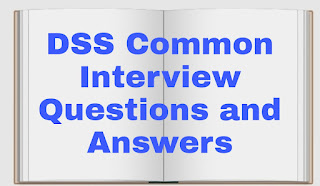DSS Common Interview Questions and Answers
Here are sample interview questions and answers for the Department of State Service (DSS):
Question: What do you know about the Department of State Service (DSS)?
Answer: The Department of State Service is a security agency in Nigeria responsible for the protection of national security interests and the prevention and detection of crimes against the state.
Question: Why do you want to work for the Department of State Service?
Answer: I have a strong passion for national security and a desire to contribute to the well-being of my country. Working for the DSS would allow me to utilize my skills and dedication to serve and protect the nation.
Question: How would you handle a situation where you suspect a colleague of engaging in unethical behavior?
Answer: I believe in upholding the highest standards of integrity. If I suspect a colleague of unethical behavior, I would report my concerns to the appropriate authorities within the organization to ensure a thorough investigation takes place.
Question: Describe your approach to handling sensitive and confidential information.
Answer: I understand the importance of handling sensitive and confidential information with the utmost care. I would follow established protocols, maintain strict confidentiality, and only share information with authorized individuals on a need-to-know basis.
Question: How do you stay updated on current security threats and trends?
Answer: I stay informed through various channels such as reading reputable news sources, attending relevant seminars and conferences, participating in training programs, and engaging in professional networks within the security field.
Question: How do you handle stressful situations and maintain composure?
Answer: I believe in maintaining a calm and composed demeanor during stressful situations. I manage stress by practicing mindfulness techniques, taking breaks when needed, and seeking support from colleagues when appropriate.
Question: How would you contribute to the intelligence-gathering efforts of the DSS?
Answer: I would contribute by employing my analytical skills to assess and interpret gathered intelligence, identifying patterns, and providing actionable insights to aid in decision-making processes.
Question: How do you ensure compliance with legal and ethical standards while conducting investigations?
Answer: I prioritize adherence to legal and ethical standards in all aspects of my work. I would familiarize myself with relevant laws and regulations, seek legal guidance when necessary, and ensure that investigations are conducted within the boundaries of the law.
Question: Give an example of a time when you had to make a difficult decision under pressure.
Answer: In a previous role, I had to make a critical decision during a crisis situation. I carefully assessed the available information, consulted with relevant stakeholders, and made a decision that prioritized the safety and security of all involved parties.
Question: How would you handle a situation where you receive conflicting instructions from superiors?
Answer: If I receive conflicting instructions, I would seek clarification from both superiors to understand their expectations and the reasoning behind their instructions. If resolution is not immediately possible, I would escalate the issue to a higher authority for guidance.
Question: How do you approach building trust and rapport with individuals from diverse backgrounds?
Answer: I believe in treating all individuals with respect, empathy, and understanding. I actively listen, value diverse perspectives, and promote inclusivity in my interactions. Building trust is a gradual process that requires open communication and a commitment to fairness.
Question: Describe your experience in collaborating with other law enforcement agencies or security organizations.
Answer: I have had the opportunity to collaborate with various law enforcement agencies in the past. Through effective communication, sharing of information, and establishing common goals, we were able to successfully coordinate efforts and achieve desired outcomes.
Question: How do you handle situations that involve a high level of ambiguity or uncertainty?
Answer: I am comfortable with ambiguity and uncertainty, as I understand that they are often part of the security field. In such situations, I rely on my ability to adapt quickly, gather as much information as possible, consult with relevant stakeholders, and make informed decisions based on the available data and analysis.
Question: What steps would you take to ensure the safety and security of sensitive facilities or high-profile individuals?
Answer: I would conduct thorough risk assessments, implement appropriate security measures such as access controls and surveillance systems, coordinate with relevant stakeholders for comprehensive security planning, and regularly review and update security protocols to address emerging threats.
Question: How do you handle situations that require balancing security measures with public privacy rights?
Answer: Balancing security measures with public privacy rights is a delicate task. I would ensure that security measures are implemented within the legal framework and respect individuals' privacy rights. Transparent communication, stakeholder engagement, and a focus on proportional and necessary security measures are key in finding the right balance.
Question: Describe your experience in conducting background checks and security clearances.
Answer: In previous roles, I have conducted thorough background checks and security clearances on individuals.

Post a Comment